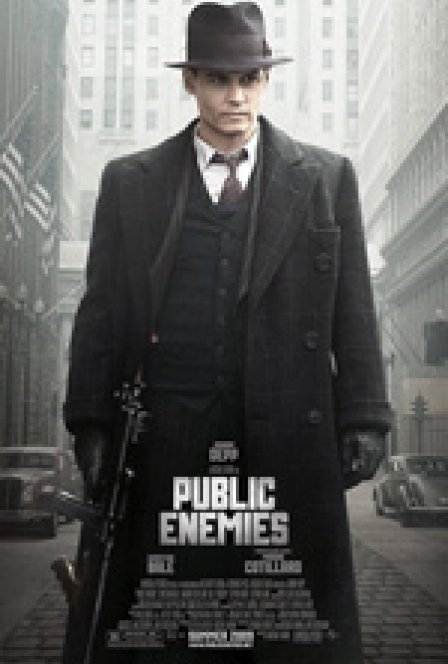Public Enemies, Michael Mann's latest macho extravaganza, is a feast for the eyes but a famine for the intellect. Its grittiness and warm color palate make high-definition filmmaking a perfect choice for capturing the 1930s mobster era, in rich sepia tones, inky blackness, or a pop of red lipstick. There's no doubt about it: Public Enemies is a beautifully constructed film. Mann has a predilection for the spectacle of heists and depictions of masculine prowess and the electrifying visual images that accompany and emphasize such dramatic stories. Sometimes the stories and characters are as compelling as the cinematography, as in such classics as Heat and The Insider. But other times Mann's projects captivate us with costumes and closeups more than characters and dialogue. Public Enemies is one of those films.
Public Enemies is the story of John Dillinger (Johnny Depp), the notorious 30s bank robber whom the floundering Federal Bureau of Investigation could never seem to capture. He was something of an icon for the generation that came of age during the Great Depression. Ruthless criminals seemed to be acting on the anger and distrust so many Americans felt, as their government turned its people into beggars. (Sound familiar?) Dillinger's two biggest political enemies were J. Edgar Hoover (played by a constipated-looking Billy Crudup), and Agent Melvin Purvis (Christian Bale). Purvis and Hoover play cat and mouse with their target for much of the film, failing to make any progress on the case until one fateful night at the movies.
Obviously, Johnny Depp seems like the perfect choice to play Dillinger. His jawline, while still chiseled, has begun to show some weathering, and his eyes have the power to woo or damn. He is our generation's Marlon Brando, wielding a kind of masculinity that both threatens and smolders. And, unsurprisingly, the man knows how to rock a fedora. But Depp strangely miscalculates the role and plays Dillinger with an irritating air of self-aware, poised cool that comes off as a shtick, rather than something complex and genuine. There is no break in the swagger or strut. When Dillinger escapes from prison and ditches town, and his wife quietly begs him, “Take me with you,” the character doesn’t abandon the hard stare and clenched jaw for even a second. Instead of seizing these rare moments of vulnerability to expose a crack in the veneer of Dillinger’s movie-star image, Mann and Depp only give us the famous bank robber, the cool cat who flashed murderous smirks for the tabloid reporters. But where, in this portrait, is the crazy Midwestern fuck who grew up in a broken home?
Depp's performance isn't the only major flaw in the film; the script is God-awful, too, full of such cringe-worthy lines as, “I enjoy fast cars, good movies, baseball, and you.” And when Agent Purvis asks Dillinger what keeps him up at night, he responds, “Coffee.” These cutesy, one-liners only emphasize Depp’s too-perfect performance. Dillinger, Purvis, and Hoover are shaped into one-dimensional embodiments of right and wrong. For a movie trying to avoid the whole summer blockbuster label, Public Enemies might just be taking itself a bit too seriously. But then again, so did Dillinger.

